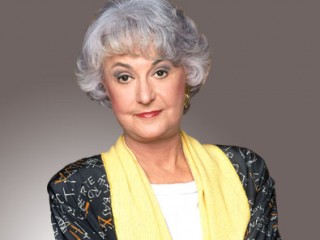
Bea Arthur biography
Date of birth : 1922-05-13
Date of death : 2009-04-25
Birthplace : New York City, New York, U.S.
Nationality : American
Category : Famous Figures
Last modified : 2010-09-07
Credited as : Hollywood Actress, role of Dorothy on "The Golden Girls", and in the sitcom Maude
0 votes so far
Bea Arthur was the voice of feminism on television as her ground-breaking character Maude in the sitcom of the same name and later shifted the Hollywood perception of young and sexy actresses as the ones who drew an audience with her depiction of Dorothy on The Golden Girls. Her work as a comedian breaking the typical roles given to women on television "made TV a little safer for women," according to comic actress Tina Fey in Entertainment Weekly. In the same article, Rosie O'Donnell concurred, stating, "She was something unique. She definitely paved the way."
Deep voiced and tall for a Hollywood woman at five foot ten inches, Arthur was not stereotypical star material. But her sense of comedic timing and her deadpan delivery made her perfect for roles where serious topics were dealt with in humorous contexts. Fey noted that Arthur's facial expressions provided much of her humor: "To get a laugh on a reaction shot where you're not speaking or even moving, that's a skill I'd like to have." Arthur, who won a Tony and two Emmys, and was nominated for several others, expected her co-stars to rise to a high level of performance. "Bea taught me to be outrageously courageous, as a comedienne to go out on a limb, to go farther than I've ever dreamed of going," Golden Girls co-star Rue McClanahan said in Entertainment Weekly.
Born in New York in 1922, Arthur remembered herself as a shy child, though classmates remembered her as funny and full of energy. She went by Bea early on, because she hated her name. Her family moved to the Eastern Shore of Maryland when she was still young; her parents ran a clothes store, and Arthur entertained the notion of being an actress. After attending Blackstone College to train as a medical technician, Arthur moved to New York to study with Erwin Piscator at the New School for Social Research. She enrolled at the Dramatic Workshop alongside future stars Tony Curtis and Walter Matthau, and future director Gene Saks, whom she later married.
Arthur took her stage name from a short-lived marriage to producer and screenwriter Robert Alan Arthur. She lengthened Bea to Beatrice because she thought it would look nice on a marquee. Her early roles on and off-Broadway featured her as a character actress, and though she auditioned for the title role in Mame, she instead earned the role of Vera Charles, Mame's sidekick, playing opposite Angela Lansbury. The pair had an excellent dynamic, and the role ultimately earned Arthur a Tony Award in 1966.
With a successful stage career, Arthur was an unknown in Hollywood until producer Norman Lear spotted her in an off-Broadway production. She sang the song "Garbage" in The Shoestring Revue, sending the audience into gales of laughter with her delivery. Lear was instantly taken with her and knew he wanted her to guest star on the CBS issue-driven comedy, All in the Family. The program featured famous television bigot Archie Bunker; Arthur played the cousin of Archie's wife, Edith, a liberal who verbally sparred with Archie over politics. Lear reported to Entertainment Weekly that before they were even finished airing the episode, CBS programming chief Fred Silverman called him, saying, "That woman, she's got to have a series of her own." They kept the character from All in the Family and spun her off into her own television program, Maude.
A six-season comedy program, Maude took a feminist position on television, dealing with topics from abortion and pornography to race relations. "We tackled everything except hemorrhoids," Arthur was quoted as having said in the New York Times. In the first two episodes, Arthur's character, in her mid-forties, finds out that she is pregnant. She and her husband decide that they are too old to raise a child, and decide to abort the child. The program aired a timely two months before the 1972 Roe v. Wade Supreme Court ruling. (Abortion was already legal in New York state, where the television program was set.) The beginning of the series elicited a lot of angry mail from viewers, something that surprised Arthur. "I really hadn't thought about the abortion issue one way or the other," she once said in a New York Times interview. "The only thing we concerned ourselves with was: Was the show good? We thought we did it brilliantly; we were so very proud of not copping out with it." The program made Arthur a public figure supporting feminism, which sometimes put additional, unwanted pressure on the actress.
After Maude ended, Arthur starred on the short-lived Amanda's before being cast as Dorothy in The Golden Girls. Along with McClanahan, Betty White, and Estelle Getty, Arthur helped change the Hollywood mindset that audiences would not be interested in a program revolving around older characters. The four women depicted both the lives and the sex lives of older women. Like Maude, the program revolved around serious issues, largely those dealing with aging, and handled them with humor. The program won two Emmy awards, and each of the four actresses received an Emmy for her work over the course of the program's run. Additionally, Golden Girls had a long life in syndication.
In her late career, Arthur starred in the one-woman show Bea Arthur on Broadway: Just Between Friends. She toured the U.S., Canada, Australia, and other countries. In addition, she worked as an advocate for animal rights and AIDS research. Divorced from Gene Saks in 1978, Arthur is survived by her two sons, Matthew and Daniel.
















